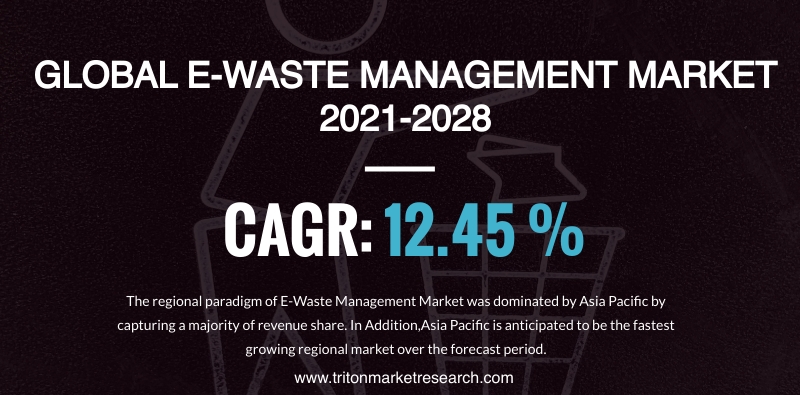As per Triton’s research report, the global e-waste management market acquired $29167.29 million in 2020, and is anticipated to advance at a CAGR of 12.45% by 2028.
A recent study by Triton Market Research titled ‘Global E-Waste Management Market’ includes the Global Analysis and Forecasts by Source Type (Consumer Electronics, Industrial Electronics, Household Appliances), Material Type (Plastic, Glass, Metal, Others), Application (Trashed, Recycled), and by Geography (Europe, Latin America, North America, Latin America, Asia-Pacific).
E-waste includes multiple metals, including lead, mercury, nickel, barium, and others. The workforce managing the e-waste is exposed to several diseases like cancer, which has influenced e-waste management companies to implement precautious methods to prevent such health threats.
Request Free Sample of the Global E-Waste Management Market Report @ https://www.tritonmarketresearch.com/reports/e-waste-management-market#request-free-sample
Triton’s research report concludes that the global e-waste management market is likely to expand at a CAGR of 12.45% in revenue, and 5.55% in volume, during the given years 2021-2028. It is also predicted to garner revenue worth $96399.98 million by 2028.
Factors such as a reduction in the lifespan of electronic devices, scarcity of sources of precious metals, and high obsolescence rate are prominent factors driving the expansion of the e-waste management market globally. In recent years, rapid technological enhancements and continual product innovations have led to a rise in the sale of electronic products, such as mobile phones, televisions, and computer devices. Moreover, new product launches with innovative and updated features have reduced electronic devices’ lifespan. Hence, these factors are encouraging market players to extend their business operations for e-waste collections, thereby fueling the studied market’s growth.
However, a surge in recycling costs incurred due to inadequacy of infrastructure, along with low awareness among developing nations, are key factors limiting the overall progression of the e-waste management market.
The market for e-waste management is primarily segmented into source type, material type, and application. Based on source type, the market is segregated into consumer electronics, industrial electronics, and household appliances. In terms of material type, it is sectioned into plastic, glass, metal, and others. Lastly, the application section is bifurcated into trashed and recycled.
Geographically, Asia-Pacific is leading the e-waste management market. Several valuable metals can be obtained from e-waste, including gold and silver. Here, retrieving new gold from mines can be expensive; however, mining them from e-waste products can be relatively cheaper for companies. The availability of valuable metals is majorly motivating the studied market progress across countries like China. Therefore, e-waste product recycling for obtaining these materials significantly enhances e-management services, further propelling the e-waste management market on a growth path.
Lifespan Recycling Co Inc, Eniro Hub Holdings Ltd, MBA Polymers Inc, Sims Metal Management Limited, Tetronics (International) Limited, Stena Metall, Boliden Group, Aurubis AG, Umicore SA, and ERI are well-known companies competing in the market.
Purchase this Report @ https://www.tritonmarketresearch.com/reports/e-waste-management-market#purchase-option
Question & Answer: E-Waste Management Market
Question 1: What are the prominent factors driving the expansion of the e-waste management market?
Answer: Factors such as a reduction in the life span of electronic devices, scarcity of sources of precious metals, and high obsolescence rate are prominent factors driving the expansion of the e-waste management market globally.
In recent years, rapid technological enhancements and continual product innovations have led to a rise in the sale of electronic products, such as mobile phones, televisions, and computer devices. Moreover, new product launches with innovative and updated features have reduced electronic devices’ lifespan. Hence, these factors are encouraging market players to extend their business operations for e-waste collections, thereby fueling the studied market’s growth.
Question 2: What key factors are limiting the overall progression of the e-waste management market?
Answer: A surge in recycling costs incurred due to inadequacy of infrastructure, along with low awareness among developing nations, are key factors limiting the overall progression of the e-waste management market.
Question 3: Which region is the leading in the e-waste management market?
Answer: Geographically, Asia-Pacific is leading the e-waste management market. Several valuable metals can be obtained from e-waste, including gold and silver. Here, retrieving new gold from mines can be expensive; however, mining them from e-waste products can be relatively cheaper for companies. The availability of valuable metals is majorly motivating the studied market progress across countries like China. Therefore, e-waste product recycling for obtaining these materials significantly enhances e-management services, further propelling the e-waste management market on a growth path.
Question 4: Which are the well-known companies competing in the e-waste management market?
Answer: Lifespan Recycling Co Inc, Eniro Hub Holdings Ltd, MBA Polymers Inc, Sims Metal Management Limited, Tetronics (International) Limited, Stena Metall, Boliden Group, Aurubis AG, Umicore SA, and ERI are well-known companies competing in the market.
Related Report:
Global Air Pollution Control System Market
The global air pollution control system market is projected to advance at a CAGR of 4.96% during the years of 2019-2027, while acquiring $101980.05 million in revenue by 2027.
Air pollution refers to the presence of toxic chemicals and compounds in the air, which can lead several health conditions to arise. Here, the utilization of pollution control practices to reduce air pollution is known as air pollution control systems.
Factors such as government regulations, rise in population, and surging air population are significantly propelling the air pollution control system market on a positive growth trajectory. Further, the rising need for these systems in cement industries and new thermal power plants set up in China and India are creating several opportunities for the studied market to reach its anticipated growth during the forecast period.
However, a decline in investments in coal power plants by developed regions, along with developments in the renewable energy market, is hampering the progress of the global air pollution control system market.
Media Contact
Company Name: Triton Market Research
Contact Person: Matt Dixson
Email: Send Email
Phone: +44 7441 911839
Address:196, wards wharf approach London E16 2EQ
Country: United Kingdom
Website: https://www.tritonmarketresearch.com/

